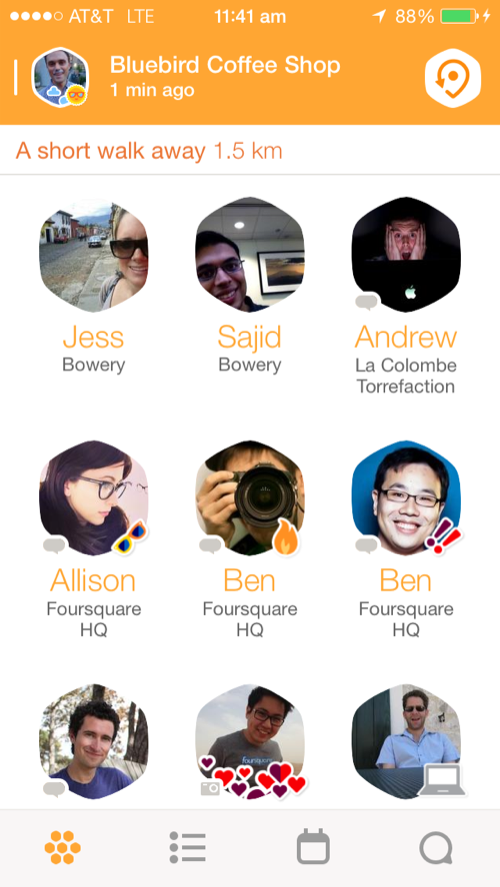Foursquare is unbundling. The company announced Thursday it’s splitting the main Foursquare application into two services—one that tracks and shares where you are, and another that helps you figure out where you’re going next.
The plan is an ambitious move to split up Foursquare’s mobile services—perhaps taking the lead from Facebook in that manner—and shed the stereotype that has plagued the app since 2009: That Foursquare is just an app for checking into places.
See Also: Foursquare CEO: How We’ll Tell You Where To Eat And What To Order
The new Foursquare app eliminates the check-in entirely, placing it instead in a separate new application called Swarm. A redesigned Foursquare app will be built from the ground up for a launch later this summer, and that app will be responsible for offering personalized recommendations in a similar way to Yelp.
“The unbundling is motivated by us listening to the users and observing the way users use the app, both watching them and seeing the data and what the data suggests,” Foursquare CEO Dennis Crowley said in an interview. “A lot of functionality is crammed into the Foursquare experience.”
Moving Beyond The Check-In
Foursquare’s directory of places, unlike Yelp’s, doesn’t feature paragraph-long diatribes that accompany the location. Instead, each location has specific “tips” or short snippets of what’s best or what to avoid at any given destination.
It will be hard for Foursquare to shift its reputation from a check-in app to a recommendation engine. Many people use Foursquare for this singular purpose, and the check-in is arguably Foursquare’s bread and butter.
It’s a risky move to rip checking in from Foursquare entirely. People are accustomed to using Foursquare for this main reason, not so much to find recommendations. Crowley said the company is building in hooks so bouncing between Foursquare apps isn’t an inconvenience, but it doesn’t change the fact that Foursquare is in completely new territory. (Again, Facebook pursued a similar strategy recently by removing the chat function from its main app and forcing users into its private Messenger app.)
Foursquare needs to be mindful about the failure of most ambient location services. Many location-broadcasting startups never caught on with the masses; Facebook has even failed multiple times with its friend-finding features, and more recently, when the company rolled out a feature nearly identical to Foursquare’s Swarm, the reaction was overwhelmingly negative.
Giving Up Privacy For Suggestions

Foursquare has spent the last four years building a massive collection of places thanks to five billion global check-ins. It doesn’t need you to add to it anymore; instead, Foursquare will learn your behaviors and provide you with suggestions as to what it thinks you will like.
Already the app alerts users to places they will probably like nearby, based on their previous locations.
“Some of those passive notifications that you’ve gotten [in the Foursquare app] is because Foursquare can just sense you’re at a certain place,” Crowley said. “Without saying too much about what the new Foursquare will look like, you can imagine a version of Foursquare that doesn’t actually need you to check into places.”
Essentially, even though Foursquare won’t be the check-in app anymore, it will still collect all your data, even without you checking in. Foursquare will use your phone’s location services paired with its vast location database to track where you go in order to provide you with location suggestions.
Foursquare won’t be sharing this location data with your friends, but Swarm will. You don’t need to check in for your friends to be able to find you. Swarm is supposed to help friends find each other easier, whether or not they check in. Its ambient location services will know your relative location even if you don’t check in, and will share that information with friends.
“The app has neighborhood awareness,” Crowley said. For instance, he said, “if I open up my app right now I’ll see 20 people checked in to Foursquare HQ in New York City, but I’ll see a handful of other friends in the Soho neighborhood who haven’t checked in anywhere.”
For users that would rather not have their friends know where they are at all times, Foursquare’s ambient location service can be turned off.
Foursquare’s new approach is interesting. Personally, I find the Foursquare location suggestions potentially helpful, though I’m not keen on my friends knowing where I am at all times—especially since many people in my Foursquare network aren’t even real friends anymore.
As a service that knows which restaurants you frequent, Foursquare telling you where to eat and what to order might come in handy. As long as you’re okay with Foursquare tracking your whereabouts the rest of the time.
All images courtesy of Foursquare
















